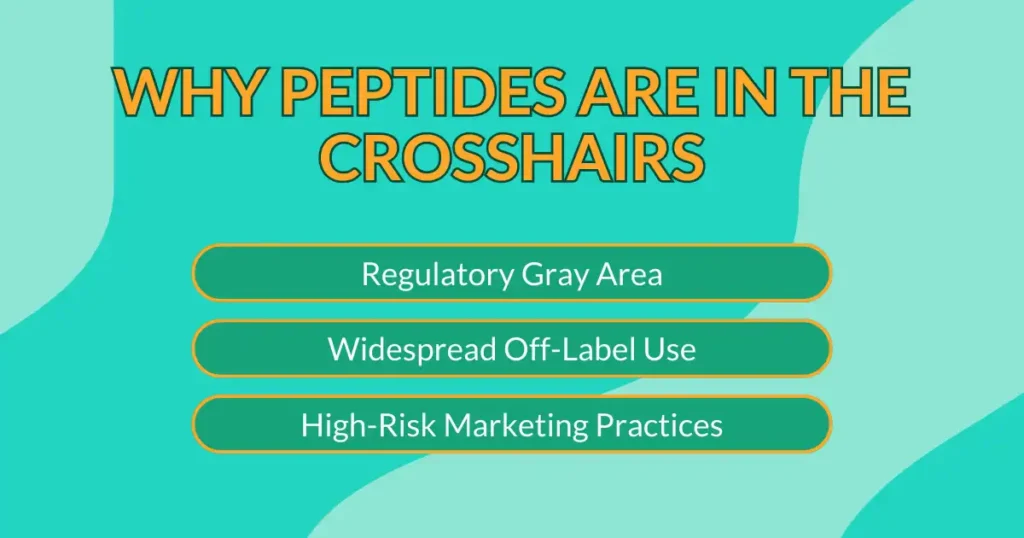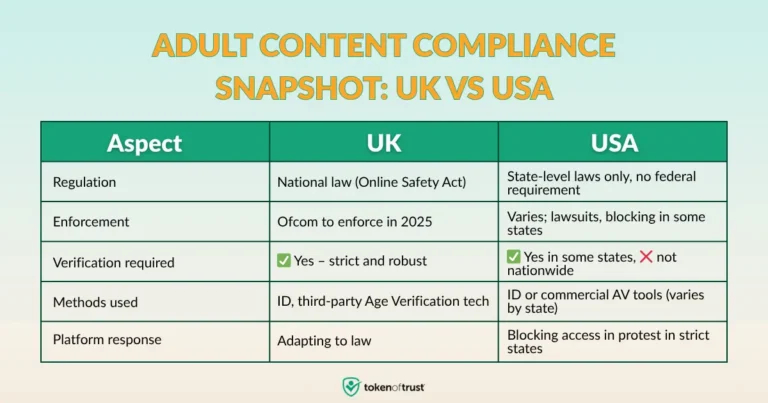How to Stay Legal in Selling Peptides Online (2025)
If you are selling peptides online, such as BPC-157, CJC-1295, or TB-500, 2025 will present significant regulatory challenges.
As of April 22, 2025, New York’s law on underage supplements is now in effect. Lawmakers in other major states consider similar bills. This means that sellers of peptides for muscle growth or performance may now face sales bans for those under 18. This applies even if they label their products as “not for human consumption.”
This blog explains how to stay compliant and protect your business. It also shows how to use simple verification without disrupting your store’s checkout process.
Why Peptides Are in the Crosshairs

Peptides are short chains of amino acids. They help trigger many biological responses. These include muscle growth, tissue repair and fat loss. People choose from the wide range popular ones like BPC-157, growth hormone-releasing peptide, and CJC-1295 in:
- Bodybuilding, improving immune system and athletic performance.
- Anti-aging, treat diseases and recovery therapies
- Experimental or off-label use
Despite these claims, the federal law does not classify these peptides as dietary supplements. They do not have approved dietary ingredients like vitamins or minerals, which may have higher risk of side effects. They are also not approved by the FDA (Food and Drug Administration) for muscle enhancement.
Instead, they fall into legally gray categories like:
- Research chemicals (often labeled “not for human consumption”)
- Experimental wellness compounds
- Drug analogues, chemically similar to controlled substances
This label and the way people are selling peptides place them in the same compliance risk as SARMs, steroids, or nootropics.
New & Pending State Regulations You Need to Know

Until recently, peptide sellers primarily focused on challenges with payment processors or customs regulations. However, this changed a lot when New York passed new laws in 2024. These laws now ban the sale of muscle-building and weight-loss supplements to anyone under 18.
This move by New York set a major precedent, making it clear that peptide sales could no longer ignore age-related restrictions. Sellers in the industry must pay more attention to compliance. They need to change their business models to avoid legal issues.
Here’s the current state of play:
In Effect:
- New York (2024): Prohibits the sale of any product marketed for muscle building or weight loss to minors. This law is an important step in controlling the sale of performance-enhancing drugs. It aims to protect young consumers from possible harm.
- New Jersey (2024): Requires parental/guardian consent for minors to purchase such products. This law aims to make sure parents know about and take part in their children’s choices about performance-enhancing supplements.
In Progress (2025):
- California, Massachusetts, Illinois, Virginia, Texas and New Hampshire have introduced or reintroduced similar legislation targeting underage access to performance-enhancing supplements.
These states are working on laws to limit access to products for muscle building and weight loss. They want to protect minors from substances that are not subject to regulation.
People do not consider peptides dietary supplements. However, selling peptides and promoting them for muscle growth or better performance can lead to legal issues for sellers. Marketing phrases like “lean mass,” “GH boost,” or “recovery enhancer” can face close examination from state rules.
Sellers should be careful about how they show these products. This will help them avoid unwanted attention from regulators. More states are planning to create similar laws soon.
Why Peptide Sellers Are at Risk (Even Without a Ban)

Here’s the kicker: Compliance doesn’t just depend on your product, it depends on your messaging.
State laws often focus on how companies promote a product, not just on what’s inside the bottle. This means that even compliant ingredients can trigger enforcement if marketing language suggests unapproved uses or benefits and the way suppliers are selling peptides.
And let’s be honest, most peptide product pages use phrases like:
- “Supports lean muscle growth”
- “Increases recovery and strength”
- “Anti-aging performance booster”
These trigger words, combined with the fact that officials haven’t approved these compounds, create significant legal risks from:
- State attorneys general can start investigations or legal actions for non-compliance. This is especially true if the marketing targets underage users.
- Payment processors: Accounts could be flagged, restricted, or terminated, limiting your ability to process transactions.
- Shipping carriers and customs: There is a risk of delays, returns or rejections of products. This can happen if products do not follow state laws.
- Online stores like Shopify and WooCommerce must follow platform rules. If they don’t, they may face account suspension, listing restrictions, or other penalties.
These combined risks highlight the importance of adhering to the latest regulations to protect your business and avoid disruptions.
How to Implement Compliant Age & State Verification

So how do you stay ahead of this mess without killing conversions?
Here’s how the smartest peptide sellers are future-proofing their stores right now:
1. Use State-Aware Age Verification
Basic “Are you 18+?” popups won’t cut it anymore. You need a system that can:
- Detect user’s location (IP or shipping address)
- Compare it against state-specific rules
- Block checkout or flag manual review if conditions aren’t met
Tools like Token of Trust offer this kind of targeted control in selling peptides through Age Verification with minimal impact on UX.
Example: A shopper in New York sees a prompt requiring age verification for a GH peptide. The system blocks checkout if you are under 18. In Texas, they might proceed normally, unless new legislation passes.
2. Choose Compatible Platforms & Plugins
Peptide stores face a double challenge: ensuring compliance while maintaining platform integration.
Many age verification plugins are awkward or can cause problems with theme integrity. This is especially true for custom Shopify themes or headless builds. Non-compliant plugins can break site elements or create bad user experiences. This can hurt sales and customer satisfaction.
Look for tools that:
- Integrate seamlessly with WooCommerce, Shopify, and custom-built sites
- Are optimized for mobile-first UX to cater to a growing number of mobile shoppers
- Offer plugin-free JS injection options if needed, minimizing technical hurdles and improving overall store performance
- Making sure your store’s systems work well together will help avoid problems. This will keep everything running smoothly and meet the latest rules.
3. Create an Audit Trail
If a regulator or payment processor asks you to prove compliance, screenshots won’t cut it.
Your system should:
- Log the date/time of each age verification
- Store the user’s self-declared age and state
- Optionally capture consent or parental override (in NJ)
This level of of how it can be trace helps you survive audits, chargebacks, and legal challenges.
Case Study: How Token of Trust Solves This
Token of Trust was built to handle exactly this kind of fragmented compliance challenge, particularly in selling peptides.
Here’s what it offers peptide merchants:
- Dynamic age verification by state or product category
- Geo-fencing for regulated SKUs
- Audit logs for regulators and payment partners
- Shopify and WooCommerce ready
- Works with high-risk processors (e.g., Corepay, PayCompass, SanctusPay)
Token of Trust is different from regular plugins. It knows that peptide merchants face legal challenges. It provides you with the tools to stay balanced.
Don’t Wait for a Lawsuit
Selling peptides today, requires running high-risk operation.
New York’s law sets the precedent. We expect additional states to enact similar regulations.
- You can wait until a customer files a complaint.
- Or until Shopify enforces compliance measures against your store.
- Or until Stripe raises a compliance issue with your account.
Or, you can get ahead of this now with state-aware, age-gated compliance.
Want Help?
📅 Want Help? Book a free compliance call with our team today and get personalized advice before regulations tighten further.
Ensure regulatory compliance. Maintain your business operations. And avoid the stress of regulatory uncertainty.






